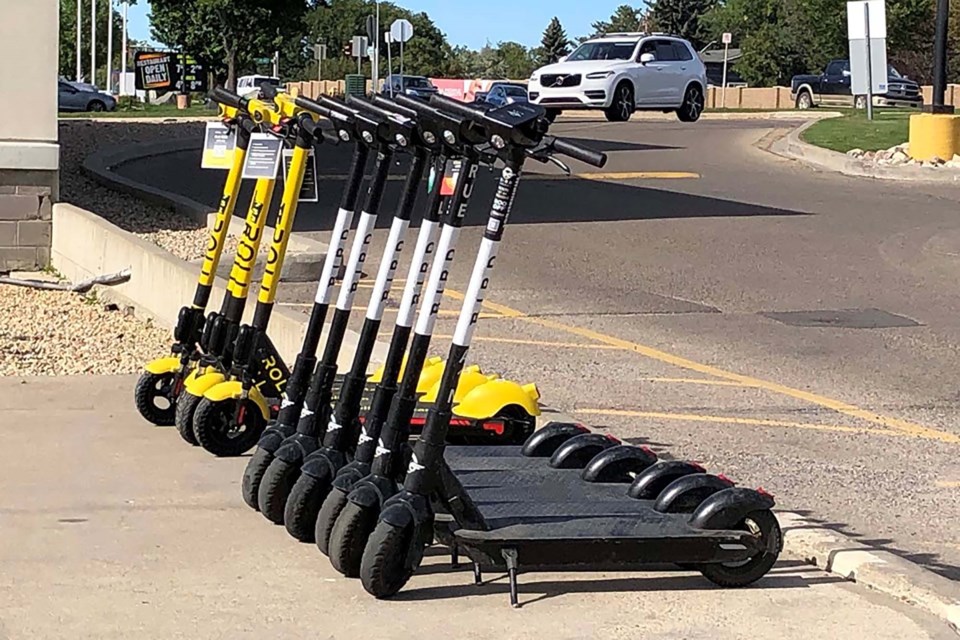E-scooters are catching on in St. Albert, new statistics suggest, but the city plans to wait another year before it moves to let more of them onto public roads.
The City of St. Albert released the 2024 e-scooter ridership numbers to the Gazette earlier this month.
St. Albert held a pilot e-scooter program in 2021–2022 that it made permanent in 2023. The program allows licensed companies to collectively field up to 300 e-scooters for rent in town provided they follow certain rules. Bird Canada and Neuron Mobility were the only e-scooter companies in St. Albert this year.
Bird Canada is the city’s longest-running e-scooter operator, having been active here since 2021. Its scooters logged about 3,026 unique riders and 12,663 trips between April and October this year, up from 2,649 riders and 10,766 trips in 2023. Most riders took about four trips, with each trip lasting about three kilometres and 19 minutes.
Neuron started in St. Albert last August. About 508 people tried their scooters this year, taking some 1,297 trips between August and November. Each trip averaged about 2.5 km and lasted around 16 minutes.
Promising start
E-scooters have traditionally been seen as a “first-mile, last-mile” option for people looking to get around a community, said Dan St. Pierre, manager of business retention and expansion with the City of St. Albert. They also appeal to impulse riders who might one to go for a spin for fun.
Many riders combine e-scooter with some other form of transportation, said Isaac Ransom, head of corporate affairs for Neuron. Data from other markets suggests that most riders were commuters in their 20s to 40s.
Sue Stasiuk of St. Albert’s Boot-n-Scooter said most of her e-scooter customers were families, although she had also had some seniors interested in sit-down models. Most used e-scooters for recreation, with e-bikes being more popular for commuting. St. Albert’s e-scooter program has netted her more customers, as many test-drive rental scooters before buying ones of their own.
Know the rules
St. Pierre reminded the public that e-scooters were not allowed on public property in St. Albert unless they were ones rented from a licensed provider (currently Bird or Neuron). Individually owned e-scooters can only be used on private property. E-scooter riders must be at least 16 years old, wear a helmet, and not ride on or in streets, buildings, parks with rubberized surfaces, parking lots, or special event zones such as the farmers’ market. Rental e-scooters are programmed not to work in certain areas and to have a top speed of 15 km/h.
Stasiuk recommended wearing a full-face or motocross-style helmet when riding an e-scooter.
“These are not slow. They go quite quick, and you can come off them quite quickly.”
St. Albert could see economic and environmental benefits from e-scooters, Ransom said, citing the company’s experience in Red Deer this year. There, about 68 per cent of trips on Neuron e-scooters resulted in an average purchase of $70 at a business, adding some $5.6 million to that city’s economy. About 49 per cent of Red Deer riders used an e-scooter in place of a car, which the company estimates has prevented some 71 tones of greenhouse gas emissions since 2021.
St. Pierre said most St. Albert e-scooter riders were following the rules, although there were definitely a few not wearing helmets. He wanted to see a full year of operations from Bird and Neuron before looking at changing the rules.
St. Pierre said e-scooters would likely return to St. Albert this May, but could pop up earlier if the weather permits.
Visit stalbert.ca/city/eps/rcmp/traffic-safety/e-scooters for more on e-scooters in St. Albert.




